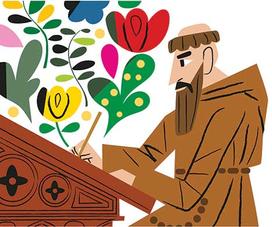Professor Simone Marchesi *02 Considers Dante’s Cross-Cultural Impact
Simone Marchesi *02’s high school had a strong STEM focus, but he felt irresistibly drawn to the study of modern languages. After earning degrees in Italian studies from the University of Pisa and the University of Notre Dame, he came to Princeton for a Ph.D. in comparative literature. “I felt perfectly at home,” he recalls, and he especially appreciated the interrelated way national literatures are taught at the University.
As an associate professor in the Department of French and Italian, Marchesi has been studying and teaching Dante Alighieri’s 14th-century masterwork, The Divine Comedy, for more than 20 years. He teaches the text both in English (in a freshman seminar) and in Italian. Although Dante wrote his epic poem in Italian, Marchesi sees him as a cosmopolitan figure who remained in constant dialogue with other languages and traditions, both ancient and contemporary.
Marchesi’s Work: A Sampling

Gardens of Delight
A view commonly held by scholars today that translation results in a loss of meaning is a recent invention, Marchesi says. Instead, he argues, Dante and his contemporaries believed that translation could increase a text’s meaning, and that every act of translation gave the original text a new life. Therefore, they welcomed the widest possible audience and embraced multiple translations. Marchesi also challenges the idea that the rise of national languages in the Middle Ages led directly to narrow-minded cultural nationalism. He focuses on the image of the always-fruitful garden as a metaphor for the productive process of translation as understood by medieval authors.

Reading Dante Today
To honor the 700th anniversary of Dante’s death, Marchesi published A proposito di Dante, roughly translated as “Speaking of Dante,” in 2020. Marchesi selected 100 passages, one from each canto (section) of the poem, and added commentary describing their current significance and relevance. Passages are illustrated by Italian artist Roberto Abbiati. Rather than depicting the narrative content of the poem, however, Marchesi and Abbiati sought to create images that visualize how the text affects the reader. Marchesi says he believes this approach captures Dante’s intent to challenge his readers and actively shape their worldview.

Image Networks
Marchesi and Professor Pamela Patton received a 2020 Rapid Response Magic Grant from the Princeton Humanities Council to support their project “Literary Visualizations.” The project will integrate the Princeton Dante Project, an online annotated edition of The Divine Comedy, with material from Princeton’s Index of Medieval Art. Marchesi hopes user access to many iconographic images related to the poem will yield new insights about Dante’s reception in his own time. For example, a famous passage in The Divine Comedy that follows a couple who fell in love while reading a book together usually depicts the lovers reading indoors. Artists from Dante’s time tended to depict them in a garden, referencing the biblical story of Adam and Eve.










No responses yet